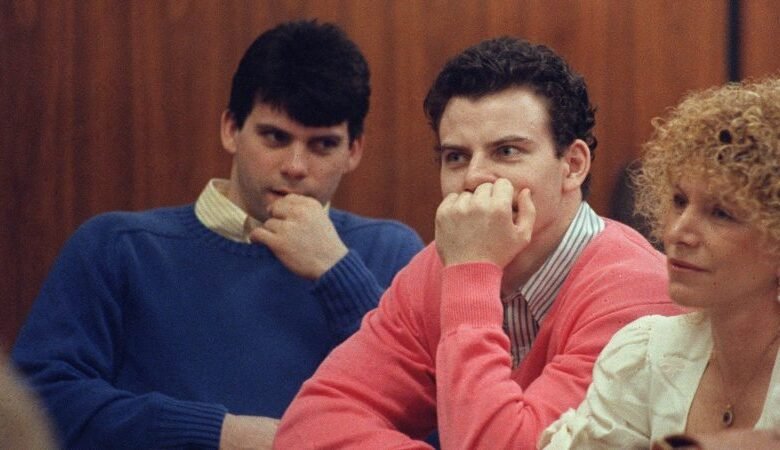
The Lyle Menendez parole hearing has captured international attention in August 2025, coming just one day after his younger brother Erik Menendez was denied parole by the California parole board. After spending more than 35 years behind bars for the brutal murder of their parents in 1989, the Menendez brothers are finally getting their chance at freedom—but the path has proven more challenging than expected.
In May 2025, a California judge resentenced both brothers to 50 years to life in prison, making them immediately eligible for parole under youth offender parole laws. This groundbreaking decision sparked renewed hope for the brothers’ release, but Erik’s parole denial after more than 30 years in prison has cast uncertainty over Lyle’s fate.
The Menendez parole hearings 2025 represent a pivotal moment in one of America’s most infamous criminal cases. With decades of legal battles, public fascination, and complex family dynamics at play, these hearings will determine whether the brothers will remain incarcerated for life or finally taste freedom in their fifties.
The Shocking Erik Menendez Parole Denial
What Happened During Erik’s Hearing
Following a hearing lasting nearly 10 hours, the state’s Board of Prison Terms ruled Thursday that Erik Menendez can reapply for parole after three years — the soonest possible interval under state law. The Erik Menendez parole denial sent shockwaves through the family and legal community who had anticipated a different outcome.
The board ultimately decided Erik would continue to “pose an unreasonable risk to public safety” if released, listing his teenage criminal history, the brutality of the 1989 killings as key factors in their decision. This determination came despite widespread family support and evidence of rehabilitation during his decades of incarceration.
Key Factors in the Denial
The California parole board considered several critical elements during Erik’s parole hearing:
- Prison conduct violations: Reports emerged about contraband incidents during his incarceration
- Original crime severity: The brutal nature of the 1989 shotgun murders
- Public safety concerns: Questions about the risk of reoffending
- Rehabilitation efforts: Programs completed and behavioral changes over 35 years
Erik Menendez’s lengthy parole hearing in California on Thursday contained several insights into his time behind bars – some of which factored into the board’s decision to refuse his request for release.
Lyle Menendez Parole Hearing: The Current Situation
The High-Stakes Friday Hearing
Lyle Menendez faces the parole board Friday, August 22, with his hearing beginning Friday morning, hours after California’s parole board concluded that Erik poses an “unreasonable risk”. The Lyle Menendez parole hearing represents his first opportunity for freedom since his conviction over three decades ago.
Unlike his brother’s case, Lyle’s parole prospects may differ due to several factors:
- Different prison records: Each brother has had unique experiences during incarceration
- Individual evaluation: The brothers have separate hearings and will be evaluated independently of each other
- Leadership roles: Lyle has taken on different responsibilities within the prison system
- Family dynamics: Different perspectives on each brother’s role in the original crimes
What’s at Stake for Lyle
The Menendez brothers case has evolved significantly since the 1990s trials that captivated the nation. The outcome of the hearing could determine whether they remain behind bars for the rest of their lives or walk free in their fifties. For Lyle, now in his late fifties, this hearing represents potentially his last realistic chance at freedom.
Family and Public Response to the Parole Proceedings
Family’s Reaction to Erik’s Denial
The brothers’ family expressed disappointment but are trying to remain optimistic about a chance at freedom following Erik’s denial. The Menendez family is “preparing for neither of them being released” ahead of Lyle’s crucial decision, indicating the emotional toll these proceedings have taken on loved ones.
The extended Menendez family has been vocal supporters of the brothers’ release, citing their rehabilitation efforts and the abuse they allegedly suffered as children. Family members have provided testimony and letters of support throughout the parole process.
Public Interest and Media Coverage
Few criminal cases have captured public attention as intensely as the Menendez murders. The brothers became household names in the early 1990s as their trials dominated headlines. The 2025 parole hearings have reignited this fascination, with extensive media coverage and public debate about justice, rehabilitation, and second chances.
Social media platforms have exploded with discussions about the Menendez brothers parole decision, with supporters and critics alike weighing in on whether the brothers deserve freedom after 35+ years of incarceration.
The Legal Journey: From Murder to Parole Eligibility
The Original Crime and Convictions
The Menendez murder case began on August 20, 1989, when José and Mary Louise “Kitty” Menendez were shot and killed in their Beverly Hills mansion. The brothers initially claimed they weren’t present during the murders, but their lavish spending and suspicious behavior led to their arrests in 1990.
The subsequent trials became a media sensation, with the defense arguing that the brothers acted in self-defense after years of sexual, physical, and emotional abuse by their father. However, prosecutors portrayed the murders as calculated killings motivated by greed and the desire to inherit their parents’ wealth.
Path to Parole Eligibility
The journey to parole eligibility has been long and complex:
- Initial sentencing: Life in prison without the possibility of parole
- Legal challenges: Multiple appeals and attempts to reduce sentences
- 2025 resentencing: Judge Michael Jesic resentenced Erik and Lyle Menendez to 50 years to life in prison, making them immediately eligible for parole under youth offender parole laws
- Current hearings: First-ever parole hearings for both brothers
What Happens Next: The Parole Decision Process
Decision Timeline and Review Process
Sometime after the hearings, a written decision will be announced by the parole hearing panel, but that decision is not final. The hearings will be followed by reviews from the California Board of Parole chief counsel and Gov. Gavin Newsom.
The parole decision process involves multiple steps:
- Initial panel decision: The three-member parole board makes the primary determination
- Legal review: Board attorneys examine the decision for legal compliance
- Governor’s review: California’s governor can uphold, modify, or reverse the decision
- Final determination: The process can take several months to complete
Possible Outcomes for Lyle
Several scenarios could emerge from Lyle’s parole hearing:
- Parole granted: Release after successful completion of the review process
- Parole denied: Continued incarceration with eligibility for future hearings
- Delayed decision: Additional review time requested by the board
- Conditional approval: Release contingent on meeting specific requirements
The Broader Impact on Criminal Justice Reform
Youth Offender Laws and Second Chances
The Menendez case has highlighted important issues in criminal justice reform, particularly regarding youth offender parole laws. The brothers were 21 and 18 years old when they committed the murders, raising questions about rehabilitation potential and the appropriateness of life sentences without parole for young offenders.
California’s evolving stance on juvenile justice and rehabilitation has played a crucial role in making these parole hearings possible. The state’s recognition that young offenders have greater capacity for change and rehabilitation has opened doors for cases like the Menendez brothers.
Precedent for Other Cases
The outcome of the Menendez parole hearings could set important precedents for other long-term inmates seeking relief under revised sentencing laws. Legal experts are closely watching these proceedings for insights into how parole boards evaluate cases involving decades-old crimes and extensive incarceration periods.
Conclusion
The Lyle Menendez parole hearing represents a critical juncture in one of America’s most notorious criminal cases. With Erik’s shocking denial casting uncertainty over the brothers’ futures, Lyle’s hearing carries even greater significance. After more than 35 years behind bars, the Menendez brothers are finally getting their chance at freedom, but the path has proven more challenging than anticipated.
Whether Lyle receives parole approval or faces the same fate as his brother Erik, these hearings mark a significant moment in the ongoing evolution of criminal justice and rehabilitation. The decision will not only determine the brothers’ futures but also send a message about second chances, rehabilitation, and the possibility of redemption after decades of incarceration.
Also Read: Cracker Barrel New Logo Sparks Massive Debate: 7 Key Facts







